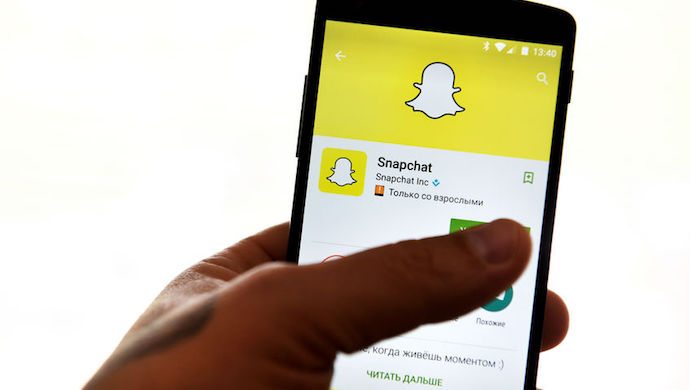CEO Evan Spiegel allegedly said in 2015 that Snapchat is “only for rich people” and that he doesn’t “want to expand into poor countries like India and Spain”

We Indians have a new-found problem. We have become jingoistic and even xenophobic to a great extent, all of a sudden — thanks mainly to a central government led by the right-wing party Bhartiya Janata Party (BJP) that often invokes nationality to whip its detractors. And we no longer tolerate criticism of the government, not to mention the country.
If you find fault with the ruling dispensation which increasingly equates itself to the nation and air your dissent on any public platform (online/offline), be prepared to face the consequences. You are now an anti-national, will be named and shamed on social media and trolled on Twitter by the hundreds who are part of the right-wing internet brigade employed by the party in power.
You are now a “libtard”and should go to Pakistan, our arch rival. You also run the risk of being slapped with sedition charges by our nationalist sarkar and you will be put behind bars indefinitely without bail. In the worst case scenario, you will can be hacked/stabbed/lynched to death.
Welcome to the new India, the shining star in the world.
Playing the nationalism card
Nationalism has been a trump card widely used by the current ruling dispensation to quell the threats coming from the so-called “sickularists (sick + secularists)” who have been critical of the government’s anti-people policies.
Honestly, I am a nationalist myself. However, my definition of nationalism is totally different from what is practised widely by a certain section of people in India, who are showing allegiance to the ruling party.
This is the best one I came across!
#boycottsnapchat pic.twitter.com/Ry8a4Zr4jH
— ❤$à¥áñtîkâ❤ (@Paul_Sayantika) April 16, 2017
Unlike them, I cannot support a government that whips up nationalism to divide and polarise people on the lines of religion, caste and creed — just to garner some votes. I will definitely voice my dissent when the government deviates from its objectives as far as the freedom of expression exists. I cannot support an army that uses special powers to shoot people to death, and rape women living in villages on the boarder. And I cannot stand for the people, who hurl racial slurs on Black people and beat them black and blue, even if they are my relatives.
Nationalism is often invoked by governments when they fail in their promises to people. The card is used as a mask by governments across the world to hide behind its failure, And India is no different.

Snapchat CEO Evan Spiegel
For anyone’s guess, nationalism is a non-issue in my country. Why should people even think of nationality when they struggle to meet both ends? To be honest, poverty and education are the most pressing issues that dog the country. Millions of my fellow countrymen are still living in abject poverty. As per a World Bank report of last year, nearly 62 per cent of Indians are poor.
The intensity of the poverty is so much so that people can still be seen searching for food in piles of garbages almost everywhere in India, and devour on the left-overs thrown on the road-side by the “have lots”. Poverty is more severe in the hinterlands. There people don’t even have roads, schools, and electricity. How can we forget the shocking visuals of Dana Majhi, a Dalit (untouchable) from Orissa, who carried his dead wife on the shoulder from the hospital for more than 10 Kms to his home for cremation.
Farmer suicide is a common issue in India. Rising prices of essentials are burning a hole in the pocket of the poor. Demonetisation has badly hit them, as most of Indians are still unbanked. Tarred roads are still a distant dream for many. Millions still live on slums.
Also read: Is “Make in India, funded by China” the new norm?
But the government is in constant denial
Despite all the tall claims by the government, India still remains a poor country. Take any social indices, the country is still far behind even some African countries. Misgovernance, corruption, and mismanagement are rampant across the states. Political parties are in league with big corporates that influence policies, which later turn out to be anti-people.
A sea change is still decades away. Even though this is the case, we don’t want someone to remind us this truth — who ever it may be. We will be offended if someone calls us poor. We cannot tolerate any comments on India. And this cannot be better understood by none other than Evan Spiegel.
Spiegel, the CEO of ephemeral chat app Snapchat, would never have thought that a comment that he had “supposedly” made against India a couple of years ago would bite him back now. According to a report by Variety published last week, Spiegel had in 2015 said Snapchat is “only for rich people” and that he doesn’t “want to expand into poor countries like India and Spain.”
The comments, which Snapchat termed ridiculous, were extracted from an unedited court petition filed by Anthony Pompliano, a former employee who worked as the firm’s growth lead for a short period in 2015.
As per this petition, Spiegel made the remarks during a September 2015 meeting with Pompilano when the startup was planning to go global. In the meeting, Pampliano claims in the lawsuit, he expressed concerns about the app not taking off in foreign markets. As he was suggesting ways to overcome the issue, he was allegedly cut off by Spiegel who said Snapchat was for rich people and that he didn’t want to expand into poor countries like India and Spain.
While the veracity of the comments are still disputed, the remarks have already kicked a storm in India. Snapchat was subjected to a hate campaign. Angry Indians downgraded the app on iOS app store and as a result, its ratings took a beating. Miffed users also uninstalled the app and trended #BoycottSnapchat on Twitter. Bollywood stars to cricket players flayed the company and Spiegel, and uninstalled the app.
Snapdeal gets hit in a mistaken identity
Since Snapchat doesn’t a huge user base in India, the campaign against the app is not going to make much impact on the startup. But curiously enough, the campaign hit another brand, which is already struggling to survive in India.
Also read: 900 million strong, Indian millennials live in an age of social commerce
As per some reports, some netizens mistakenly downgraded and uninstalled the mobile app of e-commerce player Snapdeal for its similarity to the name “Snapchat”. This is the second time Snapdeal is being subjected to a hate campaign in less than a year. Last year, the company faced the fury after its brand ambassador, Bollywood star Aamir Khan, made a comment on the rising intolerance level in India. The app was uninstalled by thousands of users and eventually, the company ended the contract with Khan.
Although Snapchat refuted the claims of calling India poor and tried some damage-control exercises, the nationalist Indians have already jumped the bandwagon and “taught the company a lesson”, over some comments that the CEO did not make. With this incident, Indians have proved to the world that India is not only poor, but needs some serious education. Hope we learn from the episode.
—-
Register for your Echelon Asia Summit access pass now! Enjoy additional 10% discount on Echelon Asia Summit Startup, Investor and Corporate passes just for being our favourite e27 reader: e27.co/echelon/asia/register/?code=EMPOWER10
The post Snapchat in hate campaign after supposed anti-India comments by Evan Spiegel; this shows India is not only poor but uneducated, too appeared first on e27.
